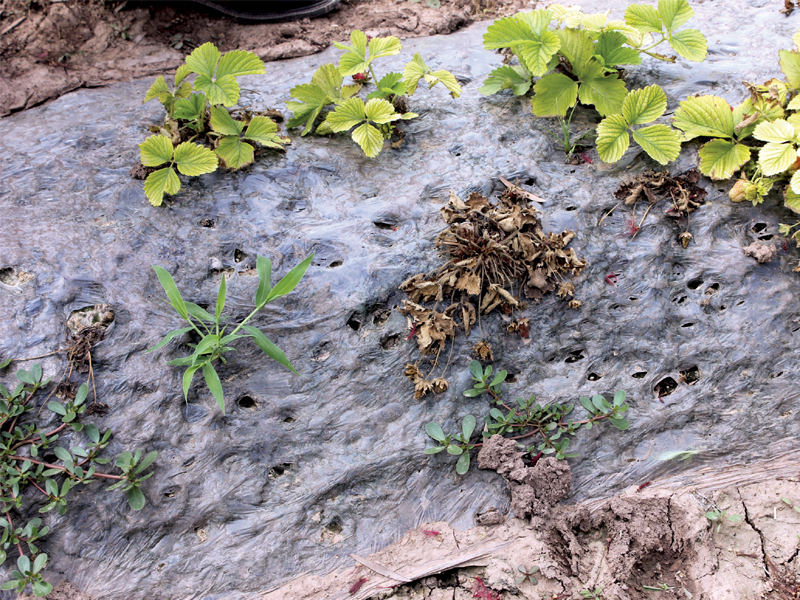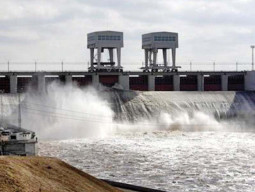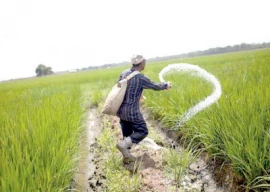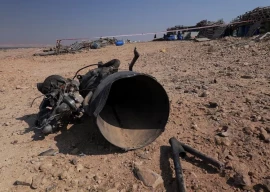
ISLAMABAD: When an intense hailstorm hit Islamabad on March 14, the wheat crop in Fareed Khan’s farm in Chak Shahzad was just weeks from being harvested.
The three-inch wide hailstones bombarded the delicate wheat plants, breaking the stems and dislodging the grains in some plants which had already flowered.
“Almost half of my wheat field was destroyed by the hailstorm. The rest of it was so badly affected that the harvest could only be used as animal feed,” said Khan, a small farmer who also grows vegetables.
At a nearby farm on the same day, Rustum Khan was harvesting the strawberries he had toiled for five months to grow.
“I lost the entire farm. The hail stones even cut through the clay sheath used to protect the strawberry roots,” said Khan, who has been growing the fruit for the past 16 years.
Pakistan has felt the wrath of climate change over the past few years, as evidenced by destructive nationwide floods, the 2010 Attabad Lake disaster and the 2012 Gayari avalanche.

But these effects don’t just occur on a large scale, as small farmers in the rural villages near Islamabad can attest to.
Meteorologists at the Pakistan Meteorological Department (PMD) said
that while seasonal rains during March in the Potohar region were expected, their volatility and magnitude indicated changing weather patterns.
The formation of hail stones, for example, was linked to volatile atmospheric conditions and ground-level temperature, which appeared to be rising in some parts of Pakistan.
The National Disaster Management Authority (NDMA) reported that the monsoon rains had gradually shifted around 80 kilometres west of Punjab.
Global Change Impact Studies Centre’s (GCISC) head of Agriculture Section Muhammad Mohsin
Iqbal shared the results of a related study with The Express Tribune.
Iqbal said GCISC had divided the country down the middle and studied temperature trends of the two halves.
“We found that over the past 50 years, the northern half of Pakistan experienced a greater rise in temperature than the southern half. This is worrisome because our glaciers and most of the forests and crops are located in the north,” said Iqbal.
The centre found that wheat crop was ripening 10 to 15 days earlier than normal due to high temperatures, which reduces yields.
As global warming warrants greater attention, Earth Day 2013, celebrated annually on April 22, has selected “Faces of Climate Change” as its theme for this year.
Some of these ‘faces’ include the small farmers on Islamabad’s outskirts like Rustum Khan, who have seen their months of hard work ruined in a matter of hours.
Earth Day will also be promoting sustainable living and a green economy; several tree plantations have been planned by public and private-sector organisations in Islamabad to mark the day.
Federal Climate Change Ministry Director-General Jawed Ali Khan said “climate resilient development” had to be exercised to mitigate the effects of climate change.
“We need to reduce our carbon foot print and for that both individuals and state institutions must collaborate and contribute,” he said.
Khan said if certain goals were set, such as to cut the carbon footprint of Islamabad in half by 2030, the government would be obligated to take steps to meet the targets.
Some of these steps could be to introduce an efficient public transport system and energy efficient building codes, Khan added.
The government launched a National Climate Change Policy in February but the action plans for its implementation are still being drafted.
Published in The Express Tribune, April 22nd, 2013.
COMMENTS (1)
Comments are moderated and generally will be posted if they are on-topic and not abusive.
For more information, please see our Comments FAQ














































wow so boring